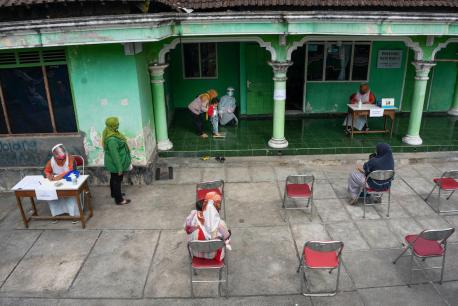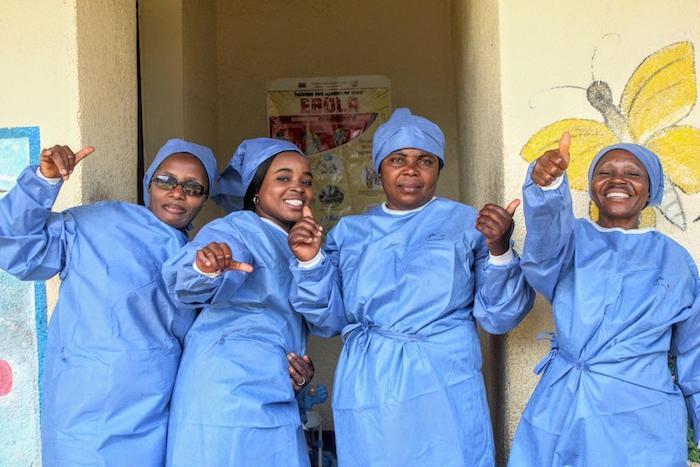
UNICEF Magic Box Commended for Inspiring Kids to Be Social Innovators
The real-time data sharing platform, created in 2014 to assist Liberia's response to the Ebola crisis, is now being leveraged by UNICEF and partners to strengthen the response to COVID-19.
The Tech Interactive, a California nonprofit organization that promotes STEAM education (STEM + arts), named UNICEF as one of its 2020 Tech for Global Good laureates for its work harnessing the power of data to improve lives.
The Tech has a particular interest in introducing young people to today's cutting-edge technology and to inspire them to think like social innovators. UNICEF, one of four organizations chosen from among thousands, received the recognition for Magic Box, a collaborative data-sharing platform created in 2014 to assist Liberia's response to the Ebola crisis.
Today, the platform supports real-time data-driven solutions in many other countries where UNICEF works.
.@UNICEF's Magic Box adds global health facility locations from @sharehealthdata to #keplergl: https://t.co/v4dX2JCOUy#DigitalPublicGoods#opensourcepic.twitter.com/WEce92Naao
— Mike Fabrikant (@mikefabrikant) January 21, 2019
"These changemakers have raised the bar in using data in new and creative ways to help people," said Katrina Stevens, President and CEO of The Tech. "Our goal is to share their stories with young people around the world, so they can be inspired to use technology to solve problems in their own communities."
The other winners were Chipsafer, which works to improve the safety and security of livestock herds while reducing ranchers’ environmental impact; Destination: Home, which uses data-based tools to end homelessness; and Opportunity Insights, an organization that uses data to fight poverty.
A 'big data' initiative made possible by contributions from private sector partners
UNICEF's Magic Box is a "big data" initiative made possible by contributions from private sector partners Telefonica, Google, IBM, Amadeus and Red Hat. By harnessing real-time data generated and shared by these partners, UNICEF is able to gain critical insights into the needs of vulnerable populations, which then supports informed decisions about how to invest resources and respond to emergencies more efficiently and effectively.

Health workers in the Democratic Republic of Congo celebrate the official end to the 2020 Ebola epidemic. As with past Ebola outbreaks, UNICEF's Magic Box data-sharing platform assisted the response by helping to track and predict the spread of the often fatal infectious disease. © UNICEF/UNI342765/Wenga
When countries were dealing with the Zika virus, Magic Box helped track and predict its spread, empowering leaders to make data-drive decisions toward prevention and containment. Today, UNICEF and partners are using it to tackle COVID-19.
Leveraging UNICEF's Magic Box to study the effects of COVID-19 containment measures
At the onset of the coronavirus pandemic, through Magic Box, UNICEF was able to quickly rally a network of AI and Big Data researchers, scientists and partners from more than 20 institutions to help understand the potential of these technologies, then build tools and analysis to support UNICEF's work.
"Counting on a strong network of scientific collaborators and readily available datasets on Magic Box has been key to timely jumping on the toughest questions this pandemic has posed — especially with the many unknowns in its early days — as well as to steer global research efforts towards the problems of the most vulnerable," says Manuel Garcia-Herranz, Chief Scientist of Magic Box.
Insights on the effects of mobility restrictions have been generated for 10 UNICEF program countries: Colombia, Cote d'Ivoire, India, Indonesia, Malaysia, Myanmar, Mozambique, Mexico, Nigeria and Ukraine. Methodologies are being developed to understand the suitability of physical distancing and other measures for refugee camps and other vulnerable settings.
Paul Pronyk, Chief of Child Survival and Development for UNICEF Indonesia, explains the value of Magic Box for preventing COVID-19 transmission in and around Jakarta, one of the most densely populated areas of the planet.
"Magic Box helped us develop real-time dashboards from big data that are updated daily, to look at population mobility and disease transmission dynamics," Pronyk says. "It gives us about a seven-day early warning of when an area is going to be COVID-infected, and when transmission is really going to start to ramp up. Having that type of real-time data is fundamental for understanding ways in which we can prevent transmission at the earliest possible stage."
Says Chris Fabian, co-founder of UNICEF's Innovation unit: "Since we built Magic Box, it's now become a part of UNICEF's infrastructure ... allowing us to make better decisions for children."
The Tech hosted a virtual field trip for students to learn more about its 2020 laureates' innovations. Watch the video recap here. UNICEF's Fabian and Pronyk are featured in Chapter 2.
Learn more about UNICEF's Magic Box at unicef.org.
The Tech Interactive is a family-friendly science and technology center located in San Jose, Calif. Its focus is on creating "immersive STEAM education resources to develop the next generation of problem solvers." The Tech for Global Good supporters include Cisco, Judy and Erica Swanson, Marimo Berk, Mozilla, NetApp and The Patrick J. McGovern Foundation.
Top photo: A child is weighed at a community health post in Sidorejo village, Central Java province, Indonesia. The COVID-19 pandemic has placed significant strain on the Indonesian health system as workers and resources are diverted to support the response. Fear of contracting the virus and physical distancing are also leading some parents to defer routine immunization and other critical health interventions. Indonesia is one of ten UNICEF program countries where the Magic Box platform is being used to assess the effects of containment measures. © UNICEF/UNI350125/Ijazah


